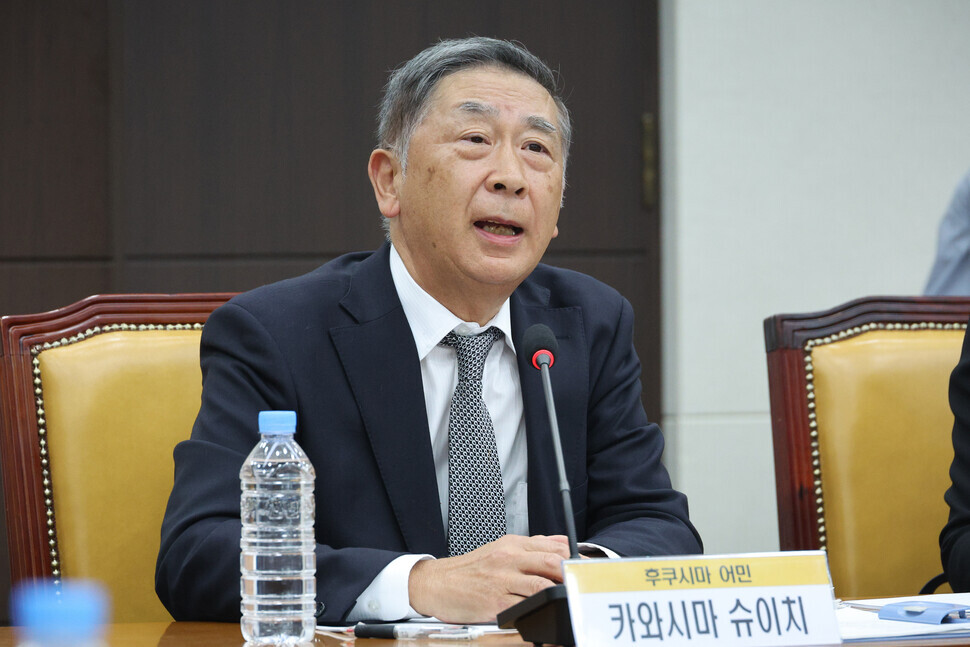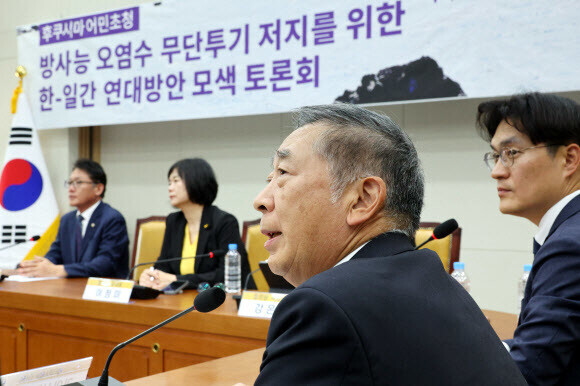hankyoreh
Links to other country sites 다른 나라 사이트 링크
“Catastrophe”: Japanese, Korean fishers voice fears of Japan’s plan to dump radioactive waste

An agreement by South Korean and Japanese leaders to have a team of South Korean inspectors visit the site where Japan is planning to release contaminated water from the Fukushima Daiichi nuclear power plant into the ocean this summer has drawn criticism from South Korea’s opposition parties and civil society over the past several days.
Their argument is that the Japanese government could use this inspection visit as a rationale for going ahead with the water’s release. Fishers from both South Korea and Japan have been unanimous in voicing concerns about Japan discharging the water into the ocean.
A 71-year-old fisherman named Syuichi Kawashima from Fukushima spoke during a debate at the National Assembly on Tuesday that was organized by the Justice Party to help Koreans and Japanese work together “to block the unauthorized dumping of radioactive water.”
“Rockfish still aren’t being sold in Fukushima because radionuclides have turned up in testing. It’s heartbreaking for Fukushima fishers to see rockfish being sold at the morning market in Miyagi Prefecture [on the north side of Fukushima Prefecture],” Kawashima said.
“Releasing contaminated water from the nuclear plant is an important issue that directly impacts everyone who shares the world’s oceans. Fish — along with the rest of the ocean’s plant and animal life — pay no mind to national borders,” the Fukushima fisher said during a press conference on Tuesday.
“We should think about this issue from the perspective of ocean life, rather than from that of humans.”

Yu Yong-ye, a 44-year-old haenyeo (female diver) on Jeju Island, also spoke during the debate.
“For the haenyeo, [releasing contaminated water from the nuclear plant] amounts to a demand to abandon our livelihood. If we can’t prevent this catastrophe that’s right around the corner, we need to be vocal about finding a way to make a living,” she said.
“I’m concerned that Japan will just use the [Korean observers’] trip as a pretext for dumping the contaminated water in July as it’s already planning to do,” said Lee Jeong-mi, head of the minor opposition Justice Party.
“What we need to do is totally scrap the plans for releasing the contaminated water and consider alternative solutions to this issue following a scientific review process.”
That idea has the backing of the Democratic Party, South Korea’s biggest opposition party. Kim Han-kyu, the party’s floor spokesperson, addressed the observers’ visit, which is supposed to take place on May 23-24, during a briefing on Tuesday.
“Two weeks [before the visit] is hardly enough to prepare for an overseas trip. Perhaps the Yoon administration just wants to clear the way for Japan to dump radioactive water at Fukushima,” Kim said.
“If this isn’t just for show, there needs to be a scientific assessment of safety that people in both countries can find persuasive.”
But the ruling People Power Party (PPP) dismissed these concerns as being “urban legends on the level of the ‘mad cow disease’ scare” and launched a “defend our ocean task force” to assess the release of contaminated water and take appropriate steps.
“The opposition party is totally uninterested in reviewing the facts of the matter. The PPP task force will protect public health by taking a purely scientific approach,” said Sung Il-jong, the PPP lawmaker who is chairing the task force.
By Lee Woo-yun, staff reporter
Please direct questions or comments to [english@hani.co.kr]

Editorial・opinion
![[Column] Season 2 of special prosecutor probe may be coming to Korea soon [Column] Season 2 of special prosecutor probe may be coming to Korea soon](https://flexible.img.hani.co.kr/flexible/normal/500/300/imgdb/original/2024/0426/3317141030699447.jpg) [Column] Season 2 of special prosecutor probe may be coming to Korea soon
[Column] Season 2 of special prosecutor probe may be coming to Korea soon![[Column] Park Geun-hye déjà vu in Yoon Suk-yeol [Column] Park Geun-hye déjà vu in Yoon Suk-yeol](https://flexible.img.hani.co.kr/flexible/normal/500/300/imgdb/original/2024/0424/651713945113788.jpg) [Column] Park Geun-hye déjà vu in Yoon Suk-yeol
[Column] Park Geun-hye déjà vu in Yoon Suk-yeol- [Editorial] New weight of N. Korea’s nuclear threats makes dialogue all the more urgent
- [Guest essay] The real reason Korea’s new right wants to dub Rhee a founding father
- [Column] ‘Choson’: Is it time we start referring to N. Korea in its own terms?
- [Editorial] Japan’s rewriting of history with Korea has gone too far
- [Column] The president’s questionable capacity for dialogue
- [Column] Are chaebol firms just pizza pies for families to divvy up as they please?
- [Column] Has Korea, too, crossed the Rubicon on China?
- [Correspondent’s column] In Japan’s alliance with US, echoes of its past alliances with UK
Most viewed articles
- 1The dream K-drama boyfriend stealing hearts and screens in Japan
- 2‘We must say no’: Seoul defense chief on Korean, USFK involvement in hypothetical Taiwan crisis
- 3AI is catching up with humans at a ‘shocking’ rate
- 4S. Korea “monitoring developments” after report of secret Chinese police station in Seoul
- 5[Column] Can we finally put to bed the theory that Sewol ferry crashed into a submarine?
- 6[Editorial] Yoon cries wolf of political attacks amid criticism over Tokyo summit
- 7[Photo] “Comfort woman” survivor calls on president to fulfill promises
- 8Doubts remain over whether Yoon will get his money out of trip to Japan
- 9Up-and-coming Indonesian group StarBe spills what it learned during K-pop training in Seoul
- 10[Editorial] Was justice served in acquittal of Samsung’s Lee Jae-yong?